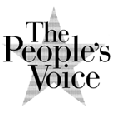Civic Journalism: Six Case Studies
BOSTON, MASS.
The People’s Voice
His 32 years in the U.S. Senate did not fully prepare Ted Kennedy for what he faced on the evening of Friday, September 16, 1994. In the midst of a close race for re-election, Kennedy had agreed to take questions from a panel of interrogators at the studios of WBZ-TV in Boston. Ordinarily, taking questions from journalists would be a breeze. One of the little secrets of politicians is that journalists are easy to manipulate; their usually obligatory “two-part questions” are predictable and easy to parry, even when hostile.
But these were not journalists Kennedy was to face. These were five ordinary Massachusetts citizens, representatives of those with the power to deny him a sixth term. For more than an hour, he took their questions, thus becoming a reluctant and defensive participant in an experiment in democracy.
When he left the studio, his discomfort was far from over. The panelists, with the help of journalist-moderators, dissected his performance as other journalists listened quietly to their analysis. For the next 48 hours, voters all over the Boston area would share the experience and study the senator for themselves in the pages of the Boston Globeand over the air on WBUR-FM and WBZ-TV.
“The People’s Voice” was being heard.
![]()
An Old Idea is Revived
Giving citizens a role in the campaign was not a new idea. In theory, it was as old as the idea of elections, but in recent years, citizens had become passive spectators watching carefully choreographed campaigns designed to manipulate public opinion rather than inform it. Candidates held the initiative, while citizens had to settle for misleading TV ads about Willie Horton and irrelevant sound-bite journalism. If campaigns were ever going to address the important issues of the day, they had to address those matters that had a bearing on public life after the election.
In 1990, “Buzz” Merritt, editor of the Wichita Eagle, came to the same conclusion. So, too, did Rich Oppel at the Charlotte Observer in 1991. Dissatisfied with the status quo, both Knight-Ridder editors decided to try something new.
Their ideas were simple:
- Convert readers from passive consumers of news to active participants in the campaign.
- Focus on citizen-identified issues, not just the candidates’ attention-grabbing gestures.
The media would become an agent of the public, surveying citizens to determine their agenda for the campaign and bringing that agenda to the candidates for response. The newspapers, on behalf of the public, would hold the candidates accountable.
![]()
The Boston Globe Signs On
The idea was familiar to Matt Storin, editor of the Boston Globe.
Storin had long been troubled by the reluctance of political leadership to set a serious agenda for deliberation in campaigns. Furthermore, the fragmentation of the media, especially by cable television, prevented the media from filling that vacuum. His conclusion: “Only a newspaper could do the kind of agenda setting that goes hand-in-hand with this kind of leadership.” He saw his newspaper — in alliance with other media and in concert with citizens — providing that agenda-setting leadership.
He had also thought about what had been done in Wichita and Charlotte. “If I thought about it long enough, I would have had us doing the same sort of thing.”

He was in that frame of mind in November 1993 when three people came calling with a proposal. Edward Miller, an associate of The Poynter Institute for Media Studies in Florida, had helped the Charlotte Observerdrastically change its campaign coverage in 1992. John Dinges, editorial director of National Public Radio, wanted to effect the same change at NPR by forming closer working alliances with selected local affiliates. Sam Fleming was news director of one of those target stations — WBUR-FM in Boston.
The trio had a mission: Persuade the Globe to join with WBUR in a project to focus the campaign coverage in 1994 on issues and to involve citizens in every step. Miller was well into the sales pitch when Storin stopped him:
“Ed., I believe in this. Now tell me how to get it done.”
Within minutes “The People’s Voice” was born.
For the next year, the Globe, WBUR-FM, and later WBZ-TV would maintain a makeshift alliance on behalf of the idea that citizens have a place in political campaigns. At best this alliance was informal; planning was on-again, off-again.
